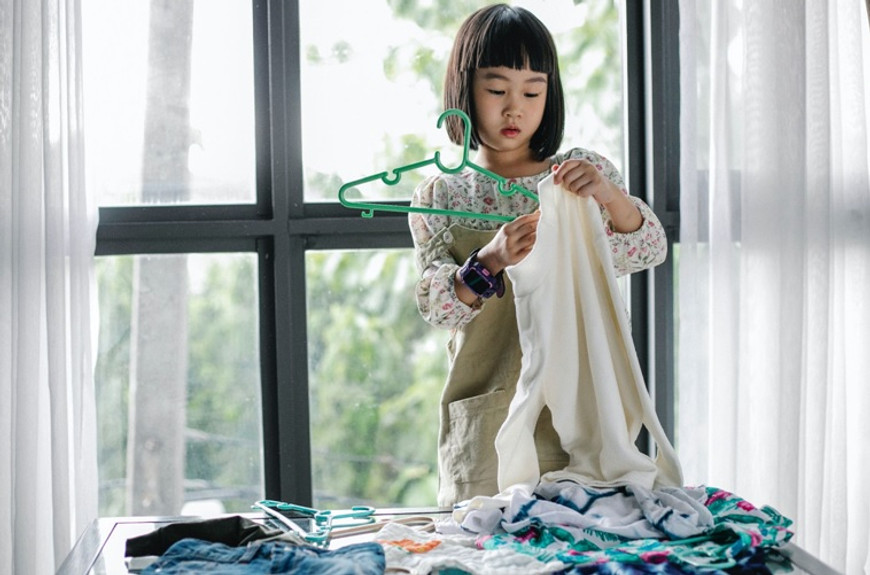When it comes to cleaning and picking up after themselves, children often don’t know anything until they’re taught. The problem is, most parents choose to take these chores on themselves to ensure that they’re done right–and in so doing, often do themselves a disservice. If your children are at an age when they’re perfectly capable of cleaning up their own messes but you still choose to do it for them, you’re depriving them of valuable life lessons regarding personal responsibility and self-reliance. You’re also creating more work for yourself.
Teaching your kids how to clean up after themselves and stay organized can have lasting benefits. According to research from the University of Minnesota, assigning children to simple household chores at an early age made them more likely to succeed in school and have good relationships with family members and friends. Here’s how to help your children see the value in being clean and organized–and do their chores willingly:
Make Cleaning and Organizing More Accessible
When you’re just starting to teach your children how to clean up after themselves, it’s best to make sure that there are little to no barriers to them being able to complete their tasks. You can make cleaning and organizing more accessible to them in a number of ways:
- Use iron-on clothing labels to personalize their laundry that will make it easier for them to sort their clean clothes. Our iron-on clothing labels here at Sticky Monkey Labels are available in a wide variety of shapes, sizes, colors, and designs. They bond to iron-safe fabrics with ease using a household iron and are compatible with many common fabrics, including cotton, polyester, poly-cotton blends, and more. Use these iron-on labels to keep your children’s clothing organized, allowing them to pick out their clothes from the hamper and get to folding.
- Give each child their own catch-all bin for toys, art supplies, books, and other small items. You can also personalize these bins with each child’s name so that everyone knows which one belongs to them.
- A triple or double hang system in your child’s closet or cabinet will make it easier for them to reach and access the hanging rods. This will encourage them to put away their clothes and allow them to see what they own, making picking outfits out easier.
- Provide each child with their own kid-friendly cleaning supplies. In a small caddy or bucket, place a bottle of a simple homemade cleaning solution (or just plain water), a duster, some soap, and a scrub brush. When cleaning time comes around, they can easily reach for these supplies and get to work.
Start with Small and Simple Chores
Kids can easily feel overwhelmed when faced with tasks that are–sometimes literally–too big for them to handle. You feel that way, too–how many times have you looked around a messy home and felt a sense of defeat about having to clean anything up before you’ve even started?
Instead of saying “everything needs to be cleaned up”, specify the tasks that you’d like for them to do during cleaning time. You can keep chores from piling up with a schedule, or by teaching your kids the Ten Minute Rule–if the task can be done in ten minutes, it’s best done right then instead of put off for later.
Never Use Cleaning as a Punishment
Punishing your children with tidying up when they’ve done something wrong will create negative associations towards what is supposed to be a necessary task. It will only result in making them less likely to want to clean up after themselves on their own.
The much better alternative to telling your kids that cleaning is something they “have to do because” is to instead present it as a gateway towards other possibilities. You can incentivize your children to clean their rooms or pick up their toys by compensating them for their work, either with monetary or non-financial rewards, such as a trip to the park or a visit to the aquarium.
Are your kids littering around the house or leaving their dishes on the table instead of bringing them to the sink? You can also discourage these behaviors by taking away a small portion of their rewards or the possibilities you’ve presented them with.
Explain Why Cleaning is Important
It’s much easier to get children to clean up and stay organized when they know why they need to do those things.
You can tell your kids all about what happens in a messy home. There’s no need to go into specifics if your children are too young, but when they’re at an age where they can clean up after themselves, they should understand basic concepts such as how germs travel and leaving the place untidy can make people sick or cause accidents around the home.

